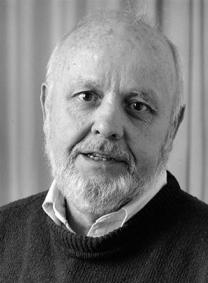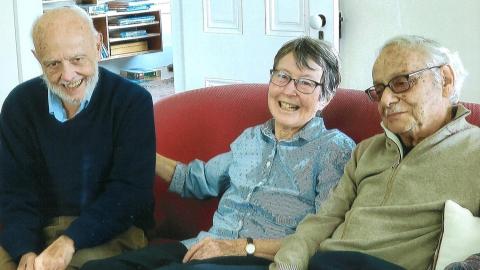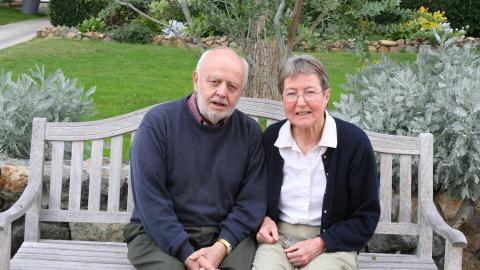Max S. Bell, prolific educator and author of definitive math curriculum, 1930–2021

This story was originally published by UChicago News. Read the article on their site here.
Co-author of Everyday Mathematics helped reshape elementary school math education
Prof. Emeritus Max S. Bell, an influential scholar of mathematics education who co-authored the widely-used curriculum Everyday Mathematics, died March 6. He was 90.
A longtime professor at the University of Chicago, Bell, AM’58, AMT’59, was known for his distinctive approach to improving math education that was grounded in real-world applications and an understanding of student experiences and capabilities built on research centered in the classroom.
Prof. Bell’s work, which included longitudinal studies of math pedagogy and teacher training, was an expansion of the educational philosophy of John Dewey—the founder of the University of Chicago Laboratory Schools—who viewed education as an essential tool for strengthening democracy and helping students reach their full potential.
In 1974, Bell published a seminal paper in The Mathematics Teacher, “What does ‘everyman’ really need from school mathematics?,” in which he articulated his belief that a useful math education would help shape students into confident, actively engaged civic participants.
“With a clear idea of what we want for everyman,” he wrote, “we can instead be ‘accountable’ for what we believe can truly help human beings cope with their world.”
Much of Bell’s work focused on the student educational experience in underserved schools on Chicago’s south and west sides. One study of Head Start students from pre-k through third grade showed that intuitive understanding of fundamental math concepts was common among students at a very early age, but deteriorated in elementary school due to a focus on rote memorization.
By raising questions about how math curriculum could be reshaped to instead teach important concepts and pattern intuition in a way that would link math to everyday life, Bell fostered a rethinking of math education that had ripple effects across the discipline.
“The ‘everyman’ paper may have been the most important one published in our field in that decade,” said Zalman Usiskin, an emeritus professor of education who directed the University of Chicago School Mathematics Project from 1987–2019 and worked closely with Bell for years.
“[Prof. Bell’s] ‘everyman’ paper may have been the most important one published in our field in that decade.”
Bell furthered his ideas about better math education with the publication of the first edition of the K–6 curriculum Everyday Mathematics—the title of which nods to the “everyman” article—from 1988–1996. In Everyday Mathematics, Max and his wife and co-author Jean F. Bell created a framework for teaching elementary school students core math skills in an accessible way. The curriculum, now in its fourth edition, has been used by tens of millions of students over more than 30 years.
Born in 1930 and raised in southern Idaho, Bell received his bachelor’s degree in mathematics from the University of California, Los Angeles in 1954, along with a teaching certificate. While at UCLA, he met his wife Jean, who would become a lifelong research partner.
After beginning his career as a high school math teacher in the San Francisco Bay Area, Bell came to the University of Chicago as part of a National Science Foundation-supported institute for teachers, through which he earned master’s degrees in education in 1958 and mathematics teaching in 1959.
In 1960, Bell received dual appointments as a teacher at the Laboratory Schools and a lecturer in the University’s Graduate School of Education, a pairing that began his career-long focus on both student and teacher education, research and curriculum development.
He became an assistant professor at UChicago in 1966 while pursuing a doctorate at the University of Michigan, which he completed in 1969, and remained on the faculty at the University of Chicago until his retirement. Bell was also an in-country instructor for national teacher development programs in Nigeria and India, and a collaborator and editor for the School Mathematics Study Group, a national mathematics education reform and curriculum project.
Over the course of his career, Bell published a series of pioneering papers, monographs and books on math education, including the monograph Mathematical Uses and Models in our Everyday World (1972) and the three-volume work Applying Arithmetic (1983), which he co-authored with Usiskin.
Bell was forward-thinking when it came to the use of technology in teaching, and explored the vast potential of calculators and computers when those technologies were just beginning to become widely available in the late 1970s and early 1980s.
“Max immediately saw the benefits that a calculator could have in an elementary classroom,” said his daughter, Colleen Bell. “That was just one of the many ways in which he was always paying attention, and constantly thinking about how new developments could have a positive impact. Long before Khan Academy, he was also thinking about online teaching resources.”
“Max immediately saw the benefits that a calculator could have in an elementary classroom.”
In 1983–84, Bell took a leave of absence from the University to direct a high school geometry program for WICAT Systems, a computer-based education startup. The geometry program was based on what was, at the time, a novel concept: an interactive digital curriculum with a proof-checker that supported multiple learning paths. The WICAT curriculum later became the content core for IBM Education Systems, where Bell worked as a program designer for nearly a decade.
With royalties from Everyday Mathematics, Max and Jean Bell helped support the creation of the Center for Elementary Mathematics and Science Education at the University of Chicago, which later became UChicago STEM Education, an organization housed in the Physical Sciences Division that promotes high-quality math and science instruction for elementary school students through research, knowledge-sharing and the development of programs and products.
After their retirement, the Bells also launched the Chicago Science Group, a social venture dedicated to innovation in science and mathematics education, which developed Science Companion, a hands-on elementary science curriculum that the Bells donated to UChicago STEM Education in 2018. That curriculum is now known as Activate Learning PRIME.
“Max was visionary, generous and instrumental to the start of our center,” said Debbie Leslie, who studied under Bell as a UChicago master’s student in the early 1990s and now works as director of education outreach and curriculum development at UChicago STEM Education.
“He gave me so many opportunities over the years to continue to learn, grow, do interesting work and make a professional impact—including teaching some of the same courses that he once taught, which feels a bit full circle,” Leslie added.
In addition to their academic work, Max and Jean Bell bought and renovated several homes in the Hyde Park area, including a design by their friend, Chicago architect Y.C. Wong. Such projects earned Bell a local reputation as a craftsman whose passion for hands-on mathematics extended to his side career as a carpenter and builder.
Bell is survived by his wife, Jean F. Bell, four children and seven grandchildren.
 THE UNIVERSITY OF CHICAGO
THE UNIVERSITY OF CHICAGO




